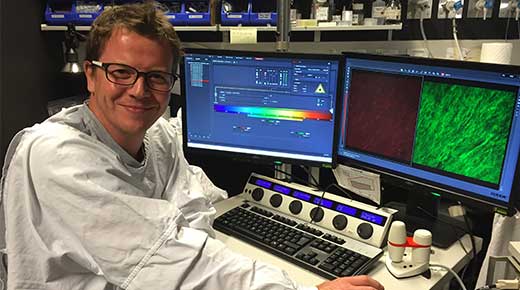
Predicting breast cancer spread before it happens
Published: 10/10/19 12:21 AM

Paul Timpson
The metastatic stage of breast cancer, when the cancer spreads beyond the breast, is treatable but not curable, and is the main cause of death from the disease.
A major hurdle to developing effective treatments for metastatic breast cancer is a lack of understanding, at a molecular level, of how and when cancer cells spread and grow.
Dr Paul Timpson has been funded by NBCF to work out a way to identify the earliest movement of breast cancer beyond the breast, and how it can be blocked at that point before it spreads to vital organs.
Dr Timpson and his team have previous success at blocking metastatic pancreatic cancer in mice. They used special nano-technology which glows to show when and where cancer cells are about to become metastatic.
They aim to recreate this success with metastatic breast cancer by combining the nano-technology with a surgically inserted titanium-framed glass window – its first application in Australia.
The researchers will be able to view live tumour cells inside the mice and watch what is happening at the earliest stages of metastasis which could help to predict the exact point that breast cancer begins to spread.
The ability to predict and stop cancer’s spread to vital organs would be a crucial breakthrough in breast cancer. The discovery could lead to effective treatments that prevent primary tumours invading other parts of the body, and determine the best timing for administering treatments.